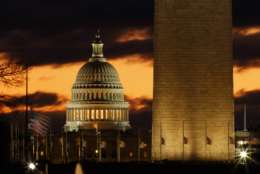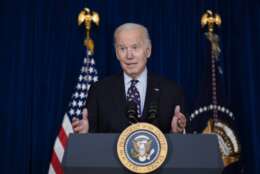Social Security
-
The WEP/Offset battle is up and running again, with renewed vigor. Since it's important to so many, Mike Causey will be taking a look at both sides of the argument.
March 10, 2022 -
Whether you are (or should be) for Postal Reform or against the Windfall and Offset laws, help is coming. John Hatton, staff VP for NARFE, will discuss the status of these on Your Turn.
March 02, 2022 -
As last Sunday's Super Bowl recedes into old news, I think there's a lesson for federal employees who work far below the political level.
February 18, 2022 -
The good news is that federal, postal, military and Social Security retirees in January will be getting the largest cost of living adjustment they’ve had in years. That is also the bad news!
December 23, 2021 -
In today's Federal Newscast, President Joe Biden will sign an executive order aimed at saving Americans time and frustration when seeking a broad array of federal services.
December 13, 2021 -
Recent legislation would get rid of the Windfall Elimination Provision (WEP) and Government Pension Offset (GPO), but the repeal would be temporary. Federal employee groups say it's better than nothing.
December 13, 2021 -
Rising inflation is expected to lead to a sizeable increase in Social Security’s annual cost-of-living adjustment, or COLA, for the year 2022
October 12, 2021 -
For somebody with a long retirement horizon ahead of them, deferring Social Security until age 70 could boost their benefit 68%. Tough call. But one worth considering very carefully.
September 09, 2021 -
If the 2022 mid-term elections are as energized as some experts predict, it could produce a Congress that might repeal or modify two 1980s laws.
September 07, 2021 -
Once again, there are dueling agendas to eliminate or offset the Windfall Elimination Provision, a pesky nuance that reduces Social Security benefits for some federal retirees.
August 09, 2021 -
The decision to collect your Social Security now or later can be a tough one. There are a number of tradeoffs.
August 03, 2021 -
Should you treat Social Security like insurance or like an investment? Your answer may affect how much money you collect.
July 27, 2021 -
If federal retirees wait until age 70 to collect Social Security, their monthly benefits could see a big increase.
July 20, 2021 -
By working another two years, an employee earning $80,000 per year can boost their retirement income by almost $30,000.
May 19, 2021 -
Once again, there are dueling agendas to eliminate or offset the Windfall Elimination Provision, a pesky nuance that reduces Social Security benefits for some federal retirees.
April 05, 2021













